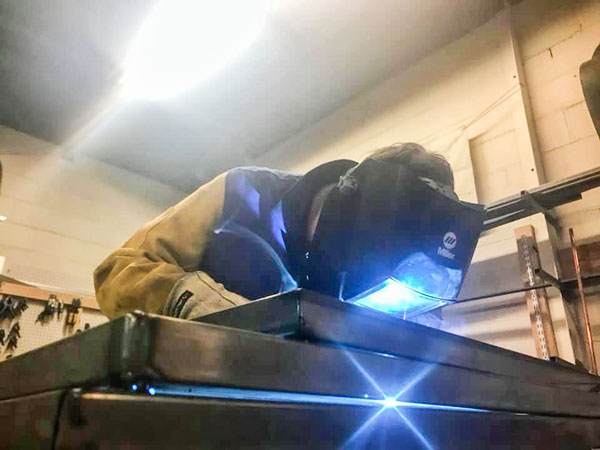Teaching the Autism community trades
By Carin R. Kirkegaard; photo courtesy of Harry Abramovitz

Recent high school graduate Harry Abramovitz learns welding as part of his curriculum at Teaching the Autism Community Trades. The program trains those with autism spectrum disorders valuable skilled trades.
Creativity can be expressed in a myriad of ways. If lucky, creating can also become a viable option for a career. Harry Abramovitz has discovered his path for a creative career with the training programs offered at Teaching the Autism Community Trades (TACT).
As far back as he can remember, Abramovitz’s passion has been figuring out how things used in everyday life function. “For my whole life, I’ve been inventive with my hands,” he said. A recent high school graduate, Abramovitz started taking welding courses with TACT in early 2020 and is considering enrolling in the auto mechanics program when he receives his welding certification.
According to the Center for Disease Control and Prevention, about 1 in 59 children are identified with an autism spectrum disorder (ASD) between the age of 3 and 17. Abramovitz was diagnosed with an ASD when he was 6. Although today he says, “It’s not a huge impact for me. I thrive in spite of it.” Getting accepted at TACT was the perfect fit for Abramovitz. The program offers vocational training, teaching those identified with an ASD auto mechanics, carpentry, computer science, welding, electronics and other hands-on skills.
In 2016, program founder Danny Combs, himself a parent of a son with ASD, decided to develop TACT – the only program of its kind in the country. Throughout the process of his son’s diagnosis with ASD, Combs worked with professionals who talked about autism being a deficit. Combs, on the other hand, wanted to talk about the talents he saw his son demonstrating. Combs had the opportunity to meet autism spokesperson and professor Temple Grandin as he was searching for programs outside of a hospital setting that would help build upon his son’s strengths. She encouraged him to stop what he was doing and to create the program he was seeking.
In Grandin’s support of TACT she said, “Jobs need to be chosen that make use of the strengths of people with ASD and not focused on their weakness … by making themselves good at a specialized field that people will be willing to ‘buy’ their skill … TACT provides a place to cultivate that.”
Skilled trades are in high demand. Based on statistics provided by the Associated General Contractors of America, 74% of manufacturing firms predict a shortfall of qualified skilled trade workers with an estimated 31 million positions that will be left vacant by 2020 as the baby boomers continue to retire.
Combs said that unemployment among those with autism is 90%, and having a college degree doesn’t help the odds; it only drops the statistic by 5%, despite that those with ASD tend to be reliable, detail-oriented focused workers. Pair these two disparate areas, baby boomers retiring and a high unemployed rate of persons with ASD, and Combs saw the perfect symbiotic opportunity for TACT.
TACT works with a variety of different employers across the Denver metro area. According to the website, “TACT has made a tremendous difference in the Denver autism community, more than doubling its program offerings, supporting and training 400 participants in skilled trades, and connecting 80% of its working-age students to their first employment opportunities.”
Abramovitz said, “TACT is one of the greatest things I’ve ever come across.” He describes setting up his welding pieces like compiling ingredients for baking a cake. Abramovitz loves the small class size. He’s in a welding class with three other students and he says he appreciates the immediate feedback from his instructor.
He sees the skills he’s learning at TACT directly helping him obtain his dream job, working at Colorado Department of Transportation (CDOT) in Castle Rock. Abramovitz completed an internship at CDOT his senior year of high school. “It was the best two months of my life – seeing how it all works,” said Abramovitz. Long-term he hopes to someday acquire an old Nash Rambler and use his skills to remodel it and get it running for his mom.